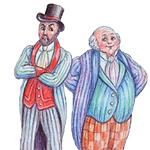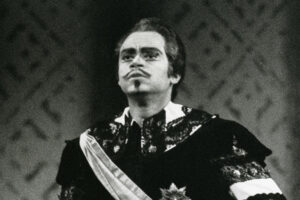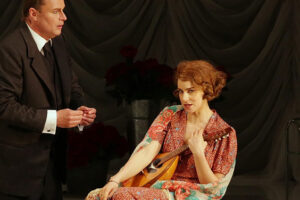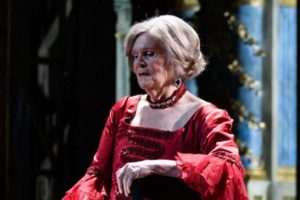

Donizetti’s happy gift for melody is not free of Rossini’s influence yet, and there’s an awful lot of cantilena from one character balanced by pitter-patter from another, but the tunesmith is plainly eager to pursue his own style, and the long score breezes by. (“I’ve got five more operas to work on this afternoon, Jacopo! Don’t slow down!”)
The prima donna has two double arias in assorted moods and is expected to ornament her repeats to the extreme of her ability (Ruth Ann Swenson would have had fun with this), but the centerpiece of the comedy is the rivalry between the basso buffi in the title roles, brothers who share a house, an import-export business, a living room and an impossible level of self-importance. One may guess that the company in Rome had two resident basso stars with complimentary gifts for which they were much admired, something like a vaudeville team.
Olivo e Pasquale dates from 1827, and Amore Opera is slyly billing it as a prequel to Don Pasquale, Donizetti’s masterpiece of 1844, which they are presenting in rep. I mean, two comic operas about two different Pasquales – what are the odds? True, last year they gave three operas about four guys named Figaro. And Figaro’s not even a saint.
Olivo, a pompous martinet, has a daughter, Isabella, whom he wishes to marry off to an unknown business partner, Le Bross. Pasquale, his brother, is a foolish old bachelor, a doting – and easily bewildered – uncle. There are three voluble servants in the house, and – surprise! – Isabella is in love with one of them. But which? The opera could be staged something like The Odd Couple, if Felix had a daughter in love with the cop. Nathan Hull, the company’s director, has elected instead to play it as a Mafia burlesque, with characters retitled “consigliere” and “enforcer” and a lot of silly business with knives. It is easy to ignore the over-busy staging and focus on Donizetti’s tunes and boilerplate farsa plot instead.
The performers on opening night were, frankly, a scrappy lot – I wish the singers and players had worked as hard on the music-making as they obviously did on the stage business, though it does make for an entertaining, swift-moving show. The orchestra, led by Gregory Buchalter (yes! There’s a full orchestra with this company!), had me wincing through the brief overture and drowned out a scene or two, but they calmed in time. Too, when accompanying the solo singers, the orchestration thinned out, the “big guitar” effect kicked in, and this was far more grateful to the ear than their attempts at symphonic concordance.
Many of the parts with this company are double or even triple-cast (don’t you wish the Met still did that?), and it was valuable last year to attend two performances of Mercadante’s I Due Figaro to hear an array of voices. (Besides, I wanted to hear that score again. O e P – may also be worthy.)
Duncan Hartman’s sonorous Don Olivo was solid, if a little woolly – he is, after all, the implacable rock, the “Roman parent,” on whom the rest of the plot breaks. An ancient Roman father was the sort who executed a son for disobeying orders; Amore Opera assumes that most people have forgotten that (no doubt they’re right), so the phrase is accompanied by a “thumbs down” gesture. David Tillistrand, the Don Pasquale, had the blissfully silly manner to contrast with his brother. His singing of the patter passages and his footwork while doing so were impressively delicate.
Elizabeth Treat sang Isabella, at first harshly but with great enthusiasm and spirit, and later in the evening some elegant triplets and very attractive passagework led to what sounded like a handsome B-flat. Hayden DeWitt was her beloved Camillo, a musico (trouser) role with very little to do – I’m sorry I missed the performance she will be singing as Camillo’s rival, Le Bross, for Le Bross must do much: charm the brothers, woo the daughter, agree in a witty duet to her suggestion that he let her marry someone else, and then he must calm the whole family down.
There appear to be two versions of the score; on opening night, Le Bross was sung by a tenor, Ray Calderon, who played very well and sang ardently, usually on pitch. Helen Van Tine was the busybody maid and John Sheehan, as a factotum with delusions of amorous grandeur, sang with more reliable pitch and grateful tone than anyone else in the cast, though his comic shenanigans somewhat obscured the point.
Amore Opera inherited the props, costumes and goodwill (all items equally inventive if flimsy) of the Amato Opera down the street when it closed its doors, but impresario/director Nathan Hull has the taste Tony Amato abandoned long ago to hear rare and unusual scores. This led to the happy occasion of Mercadante’s I Due Figaro last season and now to this winning Donizetti obscurity. One hopes there will be many more such occasions.
Olivo e Pasquale is being performed through November 3rd at the Connelly Theatre on East Fourth Street near Avenue B.
























Comments